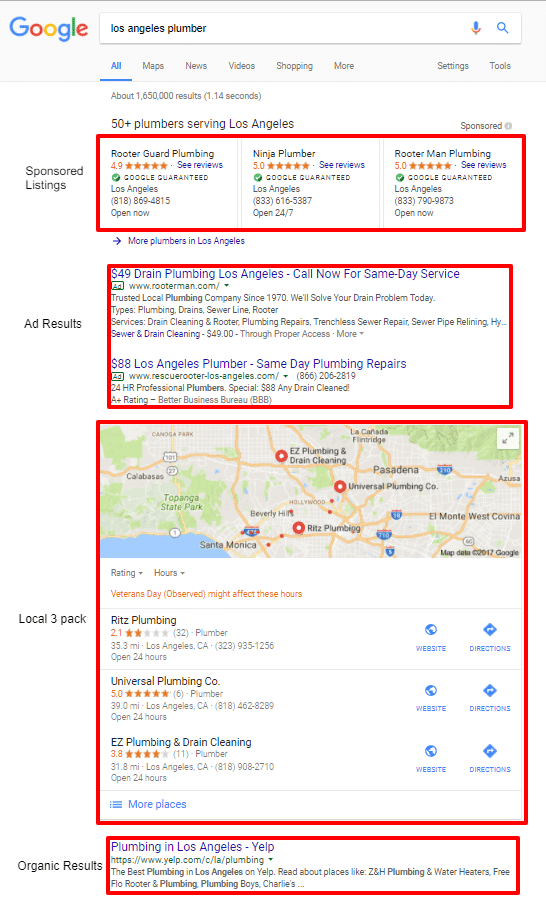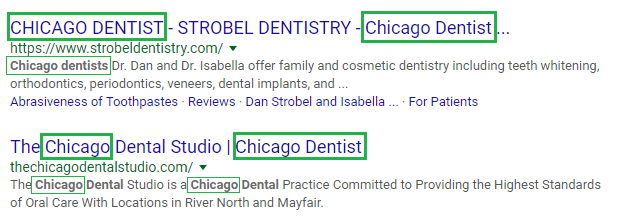As Google changes the way that it lays out its local search results, the fight for organic visibility in the local space becomes harder and harder.
In 2020, a local search result can contain the following before showing the organic results:
- A 3 pack of local results (or 4 if there is an ad result)
- A list of sponsored listings.
- Ad results.

The first organic results will tend to be local aggregators or review sites like Yelp, Angie’s List, etc.
If you don’t rank in the top 3-4 organic results, do not have any ad or sponsored listing, or are not in the local pack, you don’t exist.
Here are 4 things that any webmaster looking to improve their local visibility should do.
1. Own Your Local Citations
A citation is a mention of your business from a local source. These are usually profiles that you can create for your business that includes NAPW (name, address, phone number, website) information of your business.
Local sources include:
- Google My Business
- Bing Places For Business
- Yelp
- Social Channels like Facebook, Twitter, etc.
- Local Directories in your community/niche.
Local Citations are vital for proving to the Search Engines that your business has a local presence, provides additional pathways for users and search engines to find and review your business, and allows additional avenues for your business to communicate and build relationships with users.
2. Have a Consistent NAP-W
The Name, Address, Phone Number, and Website (NAP-W) of any external citation should match the information on the website exactly. If your business if names “Phil’s Car Parts Co.”, that is how it should appear on all the local citations mentioning your business. Even if the name is close, like “Phil’s Car Parts Company”, if the name does not match exactly, your organic local presence can suffer as a result.
There are tools and services out there, like Moz Local and Yext Listings, that can help you maintain your business listing so that they match. Moz also has a free business auditing tool that lets you check your local listings for incorrect, old, or mismatched citation data.
3. Optimize Your Meta Tags for Local
Your title and description tags are often the first impression that a user has to your website. If you are targeting your services for a certain region, then your meta tags should use the name of that region. This is just as true for the description.

Remember, when a user is looking at the SERP, they are looking for the result that will answer their query. If they are looking for dentist in Chicago, the result the user clicks on is likely to be the one that has “Dentist” and “Chicago” in the title and description.
4. Ask Your Customers to Review Your Business – or Not?
Online reviews can have a positive or negative impact on the health of a business. Online reviews are so important that there are companies that have built services around selling fake positive reviews and business owners buying them. Business owners have also engaged in less ethical ways of getting good reviews by offering discounts or giving away product free.
As a result, large review websites like Yelp have been devising ways to find and eliminate unnatural reviews from misrepresenting local businesses. Yelp went so far as to publish an article titled Don’t Ask For Reviews where it tells businesses not to ask their customers for reviews.
“Here are some tips to avoid hurting your Yelp rating:
- Don’t ask customers, mailing list subscribers, friends, family, or anyone else to review your business.
- Don’t ask your staff to compete to collect reviews.
- Don’t run surveys that ask for reviews from customers reporting positive experiences.
- Don’t ever offer freebies, discounts, or payment in exchange for reviews — it will turn off savvy consumers, and may also be illegal. Yelp has a Consumer Alerts program to let people know about businesses that engage in this sort of activity.”
Furthermore, Yelp recommends that “Your best bet to get high quality and unbiased reviews about your business is to provide a memorable and amazing customer experience — not by asking your customers to post on Yelp.”
On the other hand, a survey conducted by BrightLocal this year found that “68% of customers left a review after a local business asked them to”
While not asking for reviews will help ensure that your reviews are natural and unbiased, you will get far less of them since less people, even those that had a good experience, will tend to review their experience unless they are reminded to do so.
A good history of reviews strengthens a search engine’s perception that your business is trustworthy and has a positive impact on members of your community. The BrightLocal Survey found that “85% of customers trust online reviews as much as personal recommendations”.
Our takeaway from this and our recommendation to you when it comes to online reviews is:
- Do ask customers to review your business with multiple options, like through Yelp, Facebook, Google, etc. regardless of perceived experience.
- Never try to manipulate reviews in your favor.
- Never offer any special deals or discounts for people to review.
- Always keep an eye on the reviews of your business, communicate with your reviewers, and seek to resolve issues from any negative reviews.
Local Optimization is Not an Option, If You Want To Rank Page One
Improving the local signals of your business will improve the visibility of your website in the organic results as well as the local pack. With every new change Google makes to their search result page, it becomes more imperative that your local signals are strong, through things like citations, content, and online reviews.
This is in addition to strong traditional rankings signals like quality content, site structure, page speed, mobile optimization, etc. In 2017, there is less space for organic visibility and less room for error.
If you are a webmaster new to SEO, start going through the optimization little by little. Every improvement you make will have a positive impact on the signals Google looks at when assessing the quality of your website. If you need help, feel free to contact us anytime and we will use our tools and expertise to help you improve your website today.



